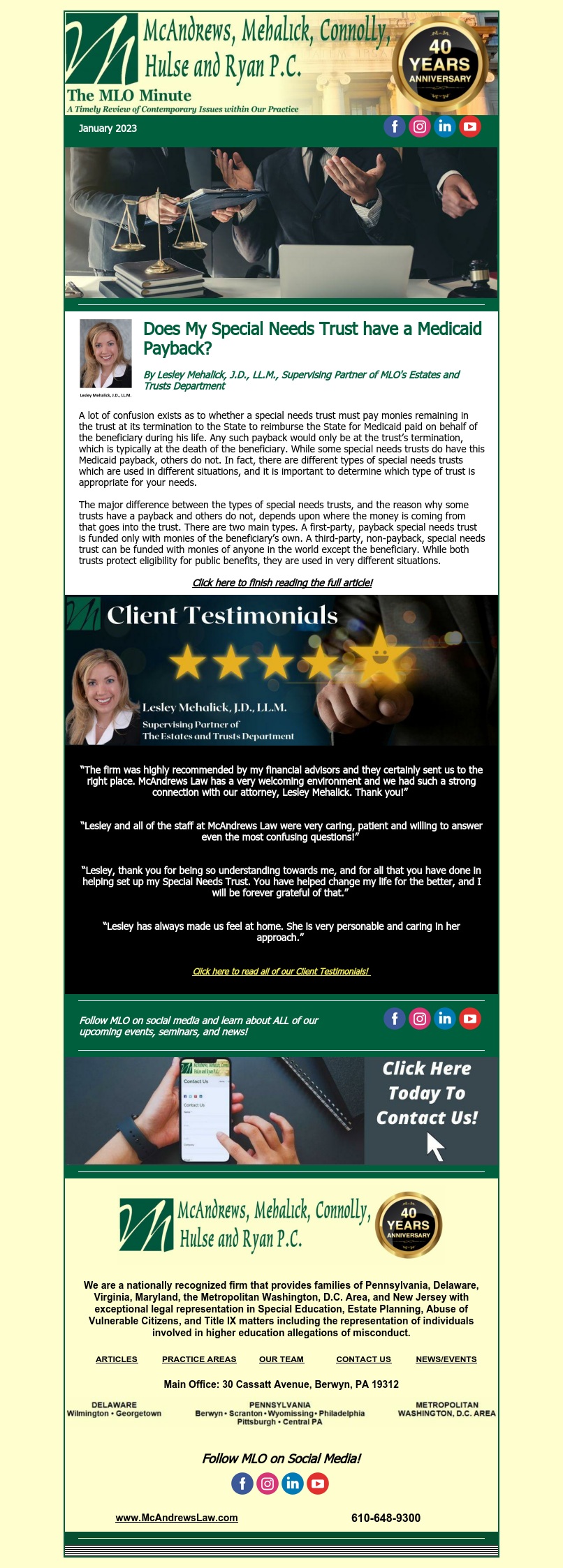January 2023:
The MLO Minute: “Does My Special Needs Trust have a Medicaid Payback?” —
By Lesley Mehalick, J.D., LL.M., Supervising Partner of The Estates and Trusts Department —
A lot of confusion exists as to whether a special needs trust must pay monies remaining in the trust at its termination to the State to reimburse the State for Medicaid paid on behalf of the beneficiary during his life. Any such payback would only be at the trust’s termination, which is typically at the death of the beneficiary. While some special needs trusts do have this Medicaid payback, others do not. In fact, there are different types of special needs trusts which are used in different situations, and it is important to determine which type of trust is appropriate for your needs.
The major difference between the types of special needs trusts, and the reason why some trusts have a payback and others do not, depends upon where the money is coming from that goes into the trust. There are two main types. A first-party, payback special needs trust is funded only with monies of the beneficiary’s own. A third-party, non-payback, special needs trust can be funded with monies of anyone in the world except the beneficiary. While both trusts protect eligibility for public benefits, they are used in very different situations.
A third-party funded special needs trust, which is also known as a supplemental needs trust, is the type of trust a parent would set up as part of their estate plan so that they can leave a share of their estate to a protected trust for the benefit of their child with special needs. A properly drafted third-party special needs trust does not have any payback provisions to the State under current law for Medicaid or any other public benefit provided to the child. As long as this third-party trust is established during the parent’s life, and the parent’s Will and beneficiary designations coordinate with the trust, then the entire share of the estate intended for the disabled child will pass directly to his non-payback, third-party trust, instead of passing to the disabled child outright. At the beneficiary’s passing, any monies remaining in the trust can go to other family members or to charities. Thus, doing this advance planning is crucial to ensure that the flexible, non-payback special needs trust can be used.
A first-party, self–funded special needs trust is appropriate when the beneficiary himself has come into monies and he wants to transfer his own monies to a trust for the purpose of public benefit eligibility. For example, if the beneficiary received a settlement from a personal injury or medical malpractice action, or if the beneficiary were to inherit money outright (and not in a supplemental needs trust), then those monies would have to go into a first-party special needs trust. First-party trusts are very important because they allow a disabled individual who comes into money to transfer his money into this first-party trust and to immediately become eligible for public benefits. There is no waiting or look back period, although there are various legal requirements that must be met before such a transfer can be made.
Monies in a first-party special needs trust can be used for the beneficiary throughout his lifetime. If the beneficiary uses all of the money in the trust, then at his passing, there would not be any pay back to the state for Medicaid provided to the beneficiary. If, however, there is money left in the trust when the beneficiary dies, then those remaining monies must be made available to the State to repay it for Medicaid provided to the beneficiary during his lifetime. Before these first-party trusts were allowed in 1993, a disabled recipient of resource-dependent public benefits who came into money had no options other than to immediately spend the money down or to lose his public benefits, spend the monies and then reapply for benefits when he no longer had any significant funds. While these first-party trusts are extremely important, it is crucial to recognize that the payback provision is only applicable to these first-party trusts because they are funded with monies of the disabled person.
Please contact our office for a greater discussion of when these two different types of trusts are used. Click here to contact us or call 610-648-9300.





